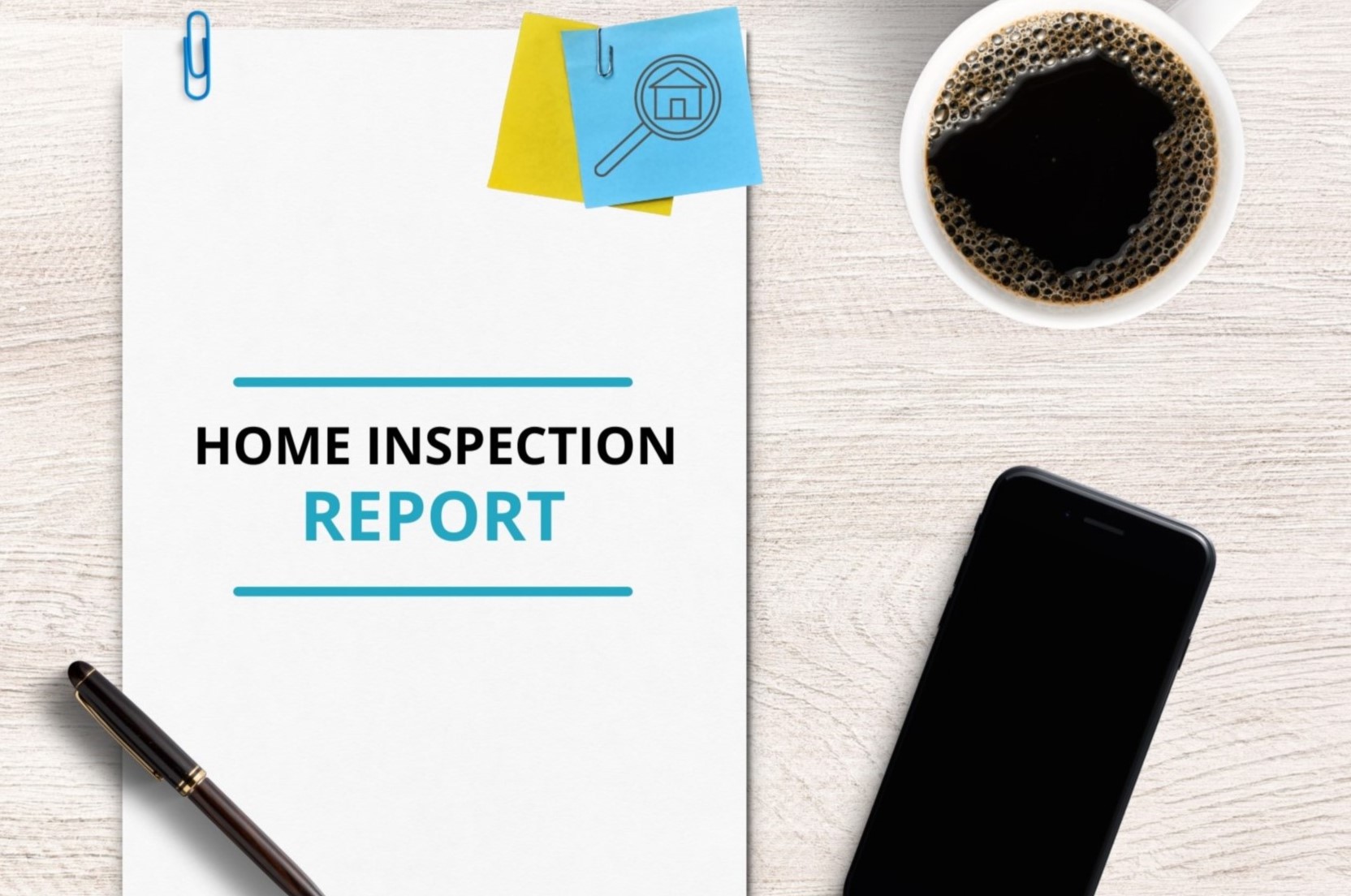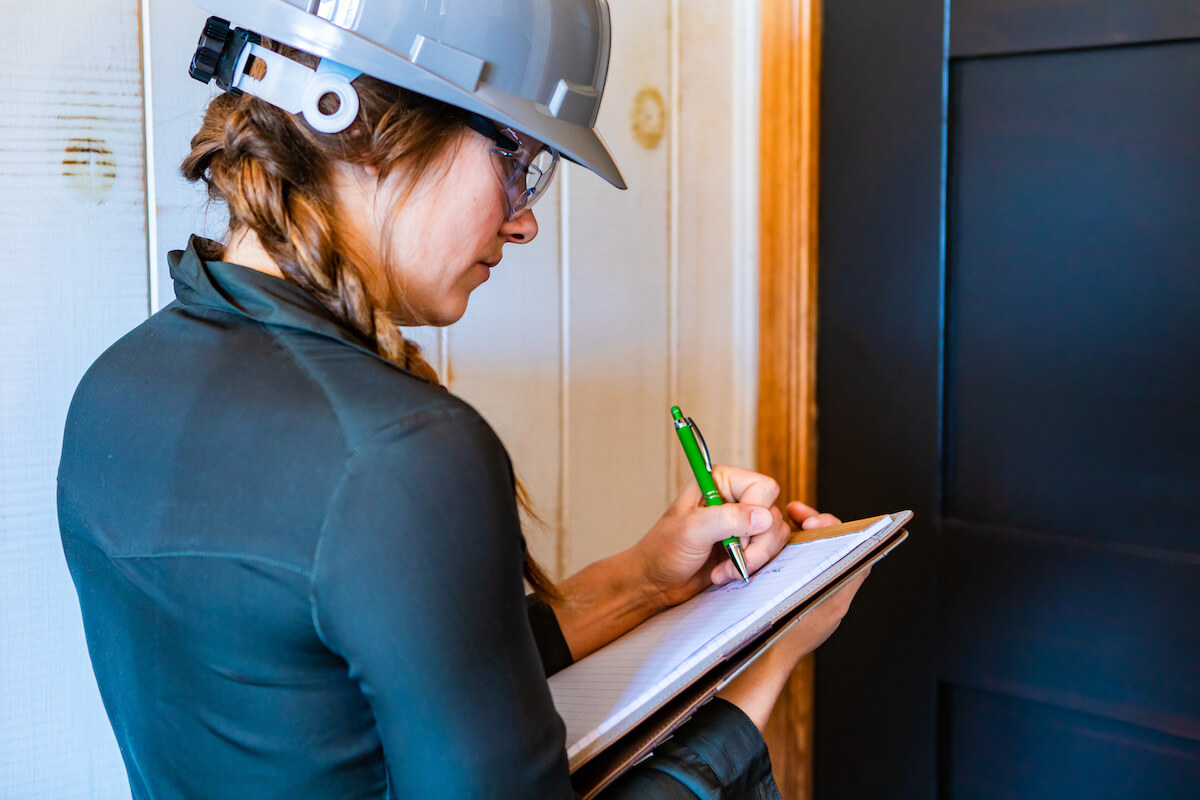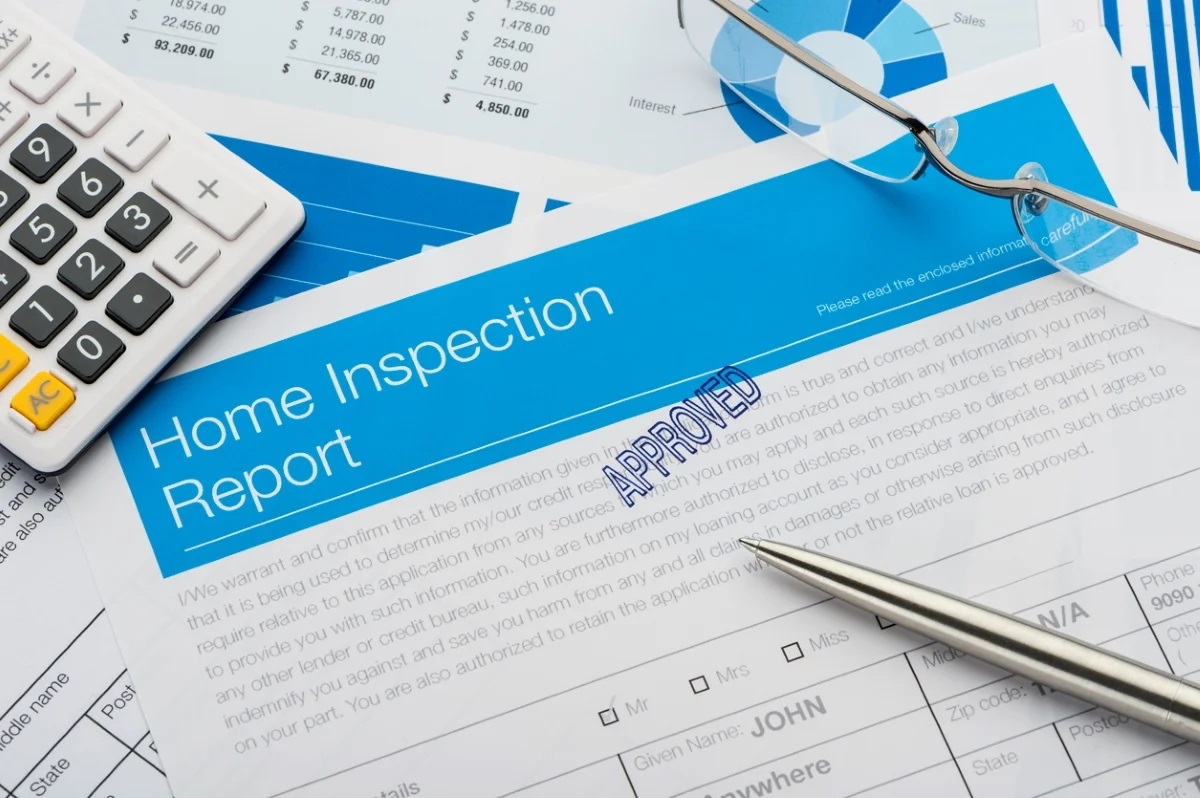Home>Home Maintenance>How To Read A Home Inspection Report


Home Maintenance
How To Read A Home Inspection Report
Modified: August 27, 2024
Learn how to interpret and understand a home inspection report with our comprehensive guide. Ensure proper home maintenance with expert tips and advice.
(Many of the links in this article redirect to a specific reviewed product. Your purchase of these products through affiliate links helps to generate commission for Storables.com, at no extra cost. Learn more)
Introduction
When it comes to maintaining a safe and functional home, regular inspections are essential. A home inspection is a thorough examination of a property, conducted by a professional inspector, to assess its condition and identify any potential issues. The findings of this inspection are typically documented in a home inspection report.
Understanding how to read and interpret a home inspection report is crucial for homeowners, as it provides valuable insights into the overall condition of the property. Whether you’re considering buying a new home or planning to sell your current one, a home inspection report can help you make informed decisions and prioritize necessary repairs or improvements.
In this article, we will delve into the key components of a home inspection report and guide you through the process of analyzing and understanding its findings. By the end, you’ll have a better understanding of the various systems and components that are evaluated in a home inspection, enabling you to take proactive steps in maintaining your home’s condition.
So, let’s dive in and explore the valuable information contained in a home inspection report!
Key Takeaways:
- Understanding a home inspection report is crucial for homeowners, buyers, and sellers to make informed decisions about repairs, maintenance, or future plans for their property’s safety and functionality.
- Prioritizing necessary repairs, proactive maintenance, and seeking professional evaluations based on the findings of a home inspection report are essential for creating a safe, comfortable, and well-maintained living environment.
Understanding the Purpose of a Home Inspection Report
A home inspection report serves as a comprehensive assessment of a property’s condition. Its primary purpose is to provide an unbiased evaluation of the various systems and components of the home, enabling homeowners to make informed decisions about repairs, maintenance, or purchases.
For buyers, a home inspection report is a crucial tool in the purchasing process. It helps uncover any hidden or potential issues that may affect the value or safety of a property. Armed with this information, buyers can negotiate repairs, request price adjustments, or even back out of the deal if necessary.
For sellers, a home inspection report can be beneficial in two ways. Firstly, it allows sellers to be proactive in identifying and addressing any issues before putting their home on the market. By resolving these issues, sellers can enhance the marketability and value of their property. Secondly, having a pre-listing inspection report can provide potential buyers with confidence and transparency in the condition of the home, potentially speeding up the sales process.
Additionally, home inspection reports are valuable for homeowners who have lived in their property for some time. Regular maintenance and upkeep are essential to ensure a safe and comfortable living environment. A home inspection report can highlight areas that may require attention, allowing homeowners to prioritize repairs and preventive measures.
It is important to note that a home inspection report is not a warranty or guarantee of a property’s condition. It is an objective assessment based on the visual inspection of accessible areas and readily accessible systems. It is always recommended to consult with qualified professionals for specialized evaluations such as pest inspections, mold assessments, or structural engineering reports.
Now that we understand the purpose of a home inspection report, let’s explore the key components that you should pay attention to when reading one.
Key Components of a Home Inspection Report
A well-prepared home inspection report should be organized and comprehensive, providing detailed information about the condition and functionality of the property. Here are the key components to look for when reading a home inspection report:
- Inspection Summary: This section provides a summary of the overall findings and any significant issues discovered during the inspection. It offers a high-level overview that helps buyers and sellers quickly assess the property’s condition.
- Structural Components: The structural integrity of a home is crucial. In this section, the inspector examines the foundation, walls, roof, and other structural elements of the property. Any signs of damage, such as cracks or leaks, will be noted, along with recommendations for repairs or further evaluation.
- Electrical Systems: The electrical system is essential for the safe and efficient operation of a home. The inspector will evaluate the electrical panel, outlets, wiring, and fixtures. Any outdated or faulty components, safety concerns, or non-compliance with building codes will be documented.
- Plumbing Systems: A thorough inspection of the plumbing systems will include checking the water supply and drainage lines, faucets, toilets, and water heater. The report may highlight issues such as leaks, water pressure problems, or signs of corrosion. Recommendations for repairs or further assessment may be provided.
- Heating, Ventilation, and Air Conditioning (HVAC) Systems: The HVAC systems play a crucial role in maintaining a comfortable indoor environment. The inspector will assess the condition and functionality of the heating and cooling systems, air filters, and ductwork. Any issues, inefficiencies, or maintenance recommendations will be noted.
- Roof and Attic: The condition of the roof is vital for protecting the structure from water damage. The inspector will examine the roof covering, flashing, and gutters. They may also inspect the attic for insulation, ventilation, and signs of leaks or pests.
- Exterior Components: This section includes a thorough examination of the exterior elements, such as the siding, windows, doors, and landscaping. Any issues like cracks, rot, or settlement will be noted. The report may also provide recommendations for repairs or maintenance.
- Interior Spaces: Inspectors evaluate the interior spaces, including walls, ceilings, floors, and staircases. They may identify issues like water stains, cracks, or signs of pests. The report may also mention the condition of appliances, cabinetry, and other interior features.
- Safety Concerns and Hazards: This section focuses on potential safety hazards within the property. It may include observations related to electrical hazards, fire safety, trip hazards, presence of asbestos or lead-based paint, or inadequate ventilation. Recommendations for addressing these hazards will be provided.
- Overall Condition and Recommendations: The report will conclude with an overall evaluation of the property’s condition. It may provide recommendations for repairs, maintenance, or further inspections by qualified professionals. This section is essential for buyers and sellers to assess the potential costs and efforts required to address the identified issues.
Understanding these key components will help you navigate a home inspection report more effectively and make informed decisions regarding the maintenance and improvement of your property.
Interpreting the Inspection Summary
The inspection summary is a crucial section of the home inspection report as it provides an overview of the inspector’s findings and highlights any significant issues discovered during the inspection. Understanding how to interpret the inspection summary is essential for buyers, sellers, and homeowners alike.
When reading the inspection summary, focus on the following key points:
- Overall Assessment: The summary may provide an overall assessment of the property’s condition, such as “good,” “fair,” or “poor.” This general evaluation can give you a quick understanding of the inspector’s opinion of the property as a whole.
- Significant Issues: The summary will highlight any significant issues that require immediate attention or further evaluation. These could range from structural defects to safety hazards or major system failures. It’s important to take note of these issues as they may impact the decision-making process.
- Recommendations: The inspector may provide recommendations for repairs, maintenance, or further assessments by qualified professionals. These recommendations can help you understand the steps you need to take to address the identified issues.
- Further Evaluation: In some cases, the inspector may identify areas or components that require further evaluation by a specialist. This could include areas such as the roof, electrical systems, or foundation. It’s important to heed these recommendations and seek additional professional opinions when necessary.
- Prospective Costs: The inspection summary may provide a rough estimate of the costs associated with repairs or maintenance. This can help you assess the financial implications of addressing the identified issues and plan accordingly.
It’s important to remember that the inspection summary is a concise overview of the most critical findings in the report. While it provides a snapshot of the property’s condition, it is essential to read the entire report to gain a comprehensive understanding of the inspector’s observations and recommendations.
If you have any questions or concerns about the inspection summary or any other section of the report, don’t hesitate to reach out to the inspector for clarification. They can provide additional insights and guidance to help you make informed decisions regarding the property.
Now that we’ve covered the interpretation of the inspection summary, let’s move on to analyzing the specific components and systems that are assessed in a home inspection report.
Analyzing the Structural Components
The structural components of a home are critical for its stability, safety, and longevity. When analyzing the structural components section of a home inspection report, it’s important to pay close attention to the following aspects:
- Foundation: The foundation is the base upon which the entire structure rests. Inspectors will assess its condition, looking for signs of cracks, settlement, or water damage. Any structural issues with the foundation should be taken seriously, as they can lead to significant problems if left unaddressed.
- Walls and Framing: The walls and framing provide the support and structure for the home. Inspectors will check for signs of bowing, sagging, or damage. They may also evaluate the quality of the materials used and confirm compliance with local building codes.
- Roof and Ceiling Structure: The roof and ceiling structure protect the home from the elements. Inspectors will examine the roofing materials, such as shingles or tiles, for damage or wear. They will also inspect the attic space for signs of leaks, proper insulation, and adequate ventilation.
- Floors and Subfloors: Inspectors will evaluate the condition of the floors, looking for any signs of damage, unevenness, or deterioration. They may also assess the integrity of the subfloor, which provides support and stability to the flooring materials.
- Windows and Doors: The windows and doors not only offer functionality and security but also play a role in the structural integrity of the home. Inspectors will assess their condition, ensuring proper installation and operation.
- Exterior Walls: The exterior walls protect the interior of the home from the elements. Inspectors will examine the siding or cladding material for damage, rot, or signs of moisture penetration. They may also evaluate the condition of the insulation and the presence of adequate moisture barriers.
- Chimneys and Fireplaces: If the home has a chimney or fireplace, inspectors will assess their condition, looking for cracks, loose bricks, or excessive creosote buildup. Proper functioning and compliance with safety standards are crucial in these areas.
- Crawl Spaces and Basements: If the home has a crawl space or basement, inspectors will evaluate their condition, checking for proper insulation, ventilation, and moisture control measures. Signs of water intrusion, mold, or pest activity should be noted and addressed.
When reviewing the findings related to the structural components, it’s essential to understand the severity of any issues identified. Minor cosmetic imperfections or wear can generally be addressed through regular maintenance. However, significant structural defects may require the expertise of a structural engineer or specialized contractor to assess the scope of repairs and ensure the safety and stability of the home.
Keep in mind that addressing structural issues can be costly and time-consuming. It’s crucial to consider the extent of the repairs, potential long-term consequences, and associated costs when making decisions based on the findings of the home inspection report.
Next, let’s explore how the electrical systems of a home are evaluated in a home inspection report.
Evaluating the Electrical Systems
The electrical systems are an essential component of any home, providing power and ensuring the safe operation of various devices and appliances. When evaluating the electrical systems section of a home inspection report, it’s important to consider the following aspects:
- Electrical Panel: The electrical panel, also known as the main breaker box, is the central hub for the distribution of electricity throughout the home. Inspectors will assess its condition and capacity, ensuring it is properly labeled, accessible, and in compliance with electrical codes.
- Outlets and Switches: Inspectors will evaluate the outlets and switches throughout the property, ensuring they are properly installed, grounded, and functioning correctly. They may use test equipment to verify the presence of ground fault circuit interrupters (GFCIs) in areas required by electrical codes.
- Wiring: The quality and condition of the wiring within a home are crucial for electrical safety and efficiency. Inspectors will assess the type of wiring used, such as copper or aluminum, and look for any visible damage, improper connections, or outdated wiring materials.
- Light Fixtures and Ceiling Fans: Inspectors will examine the light fixtures and ceiling fans, ensuring they are installed securely, properly grounded, and in good working condition. They will also check for any signs of electrical hazards, such as exposed wiring or improper installation.
- Grounding and Bonding: Proper grounding and bonding are essential for electrical safety. Inspectors will assess the grounding system, including the presence of grounding electrodes and proper bonding of electrical panels and metal components within the home.
- Arc Fault Circuit Interrupters (AFCIs) and Ground Fault Circuit Interrupters (GFCIs): AFCIs and GFCIs are crucial safety devices that help prevent electrical fires and electric shocks. Inspectors will verify the presence and proper functioning of these devices in accordance with current electrical codes.
- Overloading: Inspectors will assess if the electrical system is being overloaded by examining the number of outlets, the number of devices connected to each circuit, and the adequacy of the overall electrical capacity for the home’s needs. Overloaded circuits can pose fire hazards and should be addressed.
When reviewing the electrical systems section of a home inspection report, it’s important to pay attention to any issues or recommendations for further evaluation by a licensed electrician. Electrical issues can range from minor repairs or upgrades to more significant concerns that require immediate attention. Understanding the scope and severity of these issues can help you prioritize necessary repairs and ensure the safety of your home.
Keep in mind that electrical work is highly specialized, and it is generally recommended to consult with a qualified electrician for a more detailed assessment and to address any identified issues correctly. Their expertise will help ensure that the electrical systems in your home are safe, up to code, and functioning optimally.
Next, let’s move on to the evaluation of the plumbing systems in a home inspection report.
Assessing the Plumbing Systems
The plumbing systems of a home play a crucial role in providing clean water for consumption, facilitating proper drainage, and maintaining a functional and comfortable living environment. When assessing the plumbing systems section of a home inspection report, several key aspects should be considered:
- Water Supply Lines: Inspectors will assess the water supply lines, checking for any visible leaks, corrosion, or signs of damage. They may also examine the condition of the shut-off valves and ensure proper water pressure and flow throughout the home.
- Drainage and Waste Systems: The drainage and waste systems are responsible for removing wastewater from the property. Inspectors will evaluate the condition of the pipes, looking for signs of leakage, improper connections, or clogs. They may also assess the functionality of fixtures such as sinks, toilets, and showers.
- Plumbing Fixtures: Inspectors will inspect plumbing fixtures, such as faucets, toilets, and sinks, for proper operation and signs of leaks. They may run water through the fixtures to check for drainage issues, water pressure, and any potential problems with valves or seals.
- Water Heaters: The water heater is responsible for providing hot water throughout the home. Inspectors will assess the condition of the water heater, checking for leaks, corrosion, or improper venting. They may also evaluate the capacity and efficiency of the unit.
- Sump Pump: If the property has a sump pump, inspectors will examine its condition and operation. They will check for signs of damage or malfunction, ensuring that it is properly installed and functional in preventing water accumulation in the basement or crawl space.
- Plumbing Ventilation: Inspectors will assess the plumbing ventilation system, ensuring that it is correctly installed and provides adequate ventilation to prevent sewer odors and promote proper wastewater flow.
- Septic Systems or Sewer Connections: In certain cases, properties may have septic systems or sewer connections. Inspectors will evaluate the condition and functionality of these systems, checking for any visible issues or signs of backups.
When reviewing the findings related to the plumbing systems, look for any identified plumbing issues, such as leaks, blockages, or inadequate water pressure. Pay attention to recommendations for repairs or further evaluation by a licensed plumber.
Plumbing issues can range from minor repairs, such as fixing a leaking faucet, to more significant concerns that may involve replacing pipes or addressing issues with the sewer line. Understanding the extent of these issues will help you prioritize repairs and ensure the proper functioning of your plumbing systems.
If you have any concerns or questions about the plumbing systems, it is recommended to consult with a licensed plumber who can provide a more detailed assessment and address any identified issues correctly. Their expertise will help ensure that your plumbing systems are in good condition and functioning optimally.
Next, let’s explore the evaluation of the heating, ventilation, and air conditioning systems in a home inspection report.
Look for major issues like structural problems, water damage, and electrical issues first. Then, review the details of each section for a complete understanding.
Reviewing the Heating, Ventilation, and Air Conditioning (HVAC) Systems
The heating, ventilation, and air conditioning (HVAC) systems are responsible for maintaining a comfortable and healthy indoor environment in your home. When reviewing the HVAC systems section of a home inspection report, consider the following aspects:
- Heating Systems: Inspectors will assess the heating system, such as furnaces, boilers, or heat pumps. They will check for proper operation, look for signs of leaks or damage, and evaluate the condition of components like burners, heat exchangers, and filters.
- Cooling Systems: The cooling system, typically an air conditioning unit, is responsible for maintaining comfortable temperatures during hot months. Inspectors will assess its condition, checking for proper operation, signs of damage or leaks, and the overall efficiency of the system.
- Ductwork: Inspectors will evaluate the condition of the ductwork, which transports heated or cooled air throughout the home. They will look for any visible damage, improper connections, or leaks that can impact the efficiency and effectiveness of the HVAC system.
- Ventilation: Proper ventilation is crucial for maintaining a healthy indoor environment. Inspectors may assess the ventilation systems, such as exhaust fans in bathrooms or kitchens, to ensure they are functioning correctly and removing moisture or odors effectively.
- Thermostats and Controls: Inspectors will check the thermostats and controls for proper operation and calibration. They will ensure that the HVAC system responds accurately to temperature settings and has the necessary safety features.
- Air Filters and Indoor Air Quality: Inspectors may assess the condition of air filters and provide recommendations for regular maintenance or replacement. They may also comment on the overall indoor air quality and recommend additional measures for improvement.
- Energy Efficiency: Inspectors may provide information on the energy efficiency of the HVAC systems, such as noting the age of the equipment and whether it meets current energy efficiency standards. They may also provide recommendations for upgrades or improvements to increase energy efficiency.
When reviewing the HVAC systems section, take note of any identified issues or recommendations for repairs, maintenance, or further evaluation by an HVAC specialist. These systems can be complex, and addressing HVAC issues requires the expertise of qualified professionals.
Keep in mind that HVAC systems have a significant impact on your comfort, energy costs, and indoor air quality. By understanding the findings in the home inspection report, you can make informed decisions regarding repairs, maintenance, or potential upgrades to ensure the optimal performance of your HVAC systems.
If you have any concerns or questions about the HVAC systems, it is recommended to consult with an HVAC specialist who can provide a more detailed assessment and address any identified issues correctly. Their expertise will help ensure that your heating, ventilation, and air conditioning systems are functioning properly and providing a comfortable living environment.
Next, let’s move on to examining the roof and attic in a home inspection report.
Investigating the Roof and Attic
The roof and attic are critical components of a home’s structure, providing protection from the elements and insulation for energy efficiency. When investigating the roof and attic section of a home inspection report, it’s important to consider the following points:
- Roof Covering: Inspectors will assess the condition of the roof covering, whether it’s made of shingles, tiles, metal, or another material. They will check for signs of damage, such as missing or broken pieces, curling, or deteriorating materials.
- Flashings: The flashings are the metal pieces that prevent water from penetrating vulnerable areas, such as roof joints, chimneys, or skylights. Inspectors will inspect the flashings for signs of damage or improper installation, ensuring they effectively redirect water away from these areas.
- Gutters and Downspouts: Inspectors will examine the gutters and downspouts, checking for proper installation, cleanliness, and functionality. They will ensure that water is effectively directed away from the home’s foundation to prevent water damage and potential structural issues.
- Ventilation: Adequate attic ventilation is crucial for preventing moisture buildup and extending the lifespan of the roof. Inspectors will assess the ventilation systems, such as soffit vents and roof vents, to ensure they are properly installed and provide sufficient air circulation.
- Roof Structure: Inspectors will evaluate the structural components of the roof, including trusses, rafters, and support beams. They will check for signs of sagging, damage, or inadequate reinforcements that could compromise the roof’s stability.
- Insulation: Inspectors may assess the insulation within the attic space, checking for proper installation, thickness, and coverage. Adequate insulation helps maintain energy efficiency and temperature control within the home.
- Ventilation: Inspectors will assess the ventilation systems, such as soffit vents and roof vents, to ensure they are properly installed and provide sufficient air circulation.
- Signs of Leaks or Water Damage: Inspectors may look for any signs of leaks or water damage within the attic. This could include staining, mold growth, or signs of water intrusion. Proper flashing and roof covering are essential in preventing water damage to the attic and other areas of the home.
- Pest Activity: Inspectors will check for any signs of pest activity or damage within the attic, such as rodent droppings, chewed insulation, or nesting materials. Addressing pest issues promptly is important to prevent further damage to the attic and potential entry into the living areas of the home.
When reviewing the findings related to the roof and attic, take note of any identified issues or recommendations for repairs or maintenance. Roof repairs can vary in scope and cost, ranging from simple fixes to complete roof replacements. Understanding the condition of the roof and attic will help you prioritize necessary repairs and proactively address any potential issues.
It is important to remember that a home inspection report represents a snapshot of the property’s condition at the time of inspection. Roof conditions, in particular, can change over time due to weather events or age-related deterioration. Regular roof inspections and maintenance are essential to ensure the ongoing integrity and performance of your roof.
If you have any concerns or questions about the roof and attic, it is recommended to consult with a qualified roofing contractor who can provide a more detailed assessment and address any identified issues correctly. Their expertise will help ensure the longevity and functionality of your roof.
Next, let’s explore the inspection of the exterior components of a home.
Examining the Exterior Components
The exterior components of a home not only contribute to its curb appeal but also play a crucial role in protecting the structure from the elements. When examining the exterior components section of a home inspection report, consider the following points:
- Siding or Exterior Cladding: Inspectors will assess the condition of the siding or exterior cladding material, whether it’s vinyl, wood, brick, or another type. They will look for any signs of damage, such as cracks, rot, or pest infestation.
- Windows and Doors: Inspectors will examine the condition, operation, and installation of windows and doors throughout the property. They will check for proper sealing, weatherstripping, and any signs of damage or deterioration.
- Exterior Trim and Fascia: The exterior trim and fascia contribute to the visual appeal and protection of the home. Inspectors will assess their condition, looking for signs of rot, peeling paint, or insect damage.
- Decks, Patios, and Porches: If the home has outdoor living spaces, inspectors will examine their condition and structural integrity. They will check for proper installation, signs of rot, or any safety hazards.
- Driveway and Walkways: Inspectors may evaluate the condition of the driveway and walkways, looking for cracks, sinking, or other signs of damage that could affect safety and functionality.
- Fences and Gates: Inspectors will assess the condition and stability of fences and gates, ensuring they are properly installed and functioning. Signs of decay, damage, or inadequate repairs may be noted.
- Exterior Lighting: Inspectors may inspect the exterior lighting fixtures, ensuring they are installed correctly and functioning. Adequate outdoor lighting contributes to safety and security.
- Exterior Drainage: Proper exterior drainage is critical for preventing water accumulation and potential damage to the home. Inspectors will assess the grading, gutters, downspouts, and other drainage mechanisms to ensure they effectively divert water away from the foundation.
- Exterior Paint or Stain: If applicable, inspectors may comment on the condition of the exterior paint or stain. They will look for signs of peeling, blistering, or inadequate coverage, which could lead to moisture penetration and subsequent damage.
When reviewing the findings related to the exterior components, look for any identified issues or recommendations for repairs, maintenance, or further evaluation by specialists. Proper maintenance of the exterior components is essential to protect the home from weather conditions and ensure its long-term durability.
Keep in mind that addressing issues related to the exterior components can vary in scope and complexity, depending on the specific findings. Some repairs may be straightforward, such as replacing a damaged piece of siding, while others may require the expertise of professionals, such as a licensed contractor or painter.
If you have any concerns or questions about the exterior components, it is recommended to consult with qualified professionals who can provide a more detailed assessment and address any identified issues correctly. Their expertise will help ensure the functionality, safety, and visual appeal of the exterior of your home.
Next, let’s move on to inspecting the interior spaces of a home.
Inspecting the Interior Spaces
The interior spaces of a home are where you spend most of your time, and it’s essential to ensure they are comfortable, functional, and in good condition. When inspecting the interior spaces section of a home inspection report, consider the following areas:
- Walls, Ceilings, and Floors: Inspectors will examine the condition of the walls, ceilings, and floors throughout the property. They will look for any visible damage, such as cracks, water stains, or signs of foundation settlement. Additionally, they may evaluate the quality of paint or finishes.
- Doors and Windows: Inspectors will assess the condition, operation, and installation of doors and windows within the interior spaces. They will check for proper sealing, functionality of locks and hardware, and any signs of damage or deterioration.
- Staircases and Railings: If the property has staircases, inspectors will examine their condition and safety features, such as handrails and guardrails. They will check for stability, proper installation, and any hazards that could pose a risk to occupants.
- Cabinets and Built-In Storage: Inspectors will evaluate the condition and functionality of cabinets and built-in storage units. They will check for proper installation, signs of damage or wear, and any issues with doors, hinges, or hardware.
- Appliances and Fixtures: Inspectors may provide a general assessment of the functionality and condition of appliances and fixtures, including kitchen appliances, bathroom fixtures, and other built-in features like fireplaces or in-home entertainment systems.
- Fireplaces and Chimneys: If the property has a fireplace and chimney, inspectors will assess their condition, checking for proper installation, signs of damage, or potential fire hazards.
- Plumbing Fixtures: Inspectors may evaluate the condition and operation of plumbing fixtures, such as sinks, toilets, and showers. They will check for leaks, proper functioning, and signs of damage.
- Light Fixtures and Electrical Outlets: Inspectors may test a representative number of light fixtures and electrical outlets to ensure proper operation. They will check for wiring issues, loose connections, or other electrical concerns.
- Fire and Safety Measures: Inspectors will assess the presence and functionality of smoke detectors, carbon monoxide detectors, and other fire and safety measures within the interior spaces of the home.
When reviewing the findings related to the interior spaces, take note of any identified issues or recommendations for repairs or maintenance. Evaluate the severity of any issues and prioritize necessary repairs or upgrades based on safety, functionality, and personal preferences.
Keep in mind that some issues related to the interior spaces may be cosmetic in nature and can be addressed with minor repairs or updates. However, it’s important to address any safety concerns or significant issues promptly to ensure a safe and comfortable living environment.
If you have any concerns or questions about the interior spaces, it is often helpful to consult with professionals, such as contractors or specialists in specific areas (e.g., electricians, plumbers, or painters), who can provide a more detailed assessment and address any identified issues correctly. Their expertise will help ensure the functionality, safety, and aesthetics of the interior spaces of your home.
Now, let’s move on to discussing the identification of safety concerns and hazards in a home inspection report.
Identifying Safety Concerns and Hazards
A home inspection report not only focuses on the condition of a property but also identifies any potential safety concerns and hazards that could pose risks to occupants. When reviewing the section on safety concerns and hazards, pay attention to the following points:
- Electrical Hazards: Inspectors will look for electrical hazards, such as exposed wiring, overloaded circuits, or outdated electrical panels. These hazards can pose the risk of electrical shocks or fires if left unaddressed.
- Fire Safety: Inspectors assess fire safety measures, including the functionality and presence of smoke detectors, carbon monoxide detectors, fire extinguishers, and fire-rated doors. They will highlight any issues that could compromise the safety of occupants in the event of a fire.
- Structural Safety: Inspectors will note any structural issues that may affect the safety of the home, such as sagging floors, unstable stairs or railings, or signs of foundation problems. These hazards can lead to accidents or injuries if not addressed.
- Indoor Air Quality: Inspectors may identify potential indoor air quality issues, such as mold growth, pest infestation, or the presence of substances like asbestos or lead-based paint. These hazards can adversely affect the health of occupants, especially those with respiratory conditions or allergies.
- Water Intrusion and Moisture Issues: Inspectors will highlight any signs of water intrusion or moisture-related problems, which can lead to mold growth, rot, or structural damage. Excessive moisture can also contribute to the presence of pests or compromise the building envelope.
- Hazardous Materials: Inspectors may identify hazardous materials, such as asbestos-containing materials or lead-based paint, especially in older homes. They will recommend further evaluation or testing by specialists to determine the proper handling and remediation of these materials.
- Tripping or Falling Hazards: Inspectors will note any tripping or falling hazards within the property, such as uneven walkways, loose handrails, or obstructed paths. Addressing these hazards is important to prevent accidents, especially for young children, elderly individuals, or individuals with mobility limitations.
- Plumbing and Gas Leaks: Inspectors will check for plumbing leaks or gas leaks, noting any potential safety hazards. Leaking pipes or gas lines can cause water damage, fire hazards, or carbon monoxide poisoning.
- Radon or Other Environmental Hazards: Inspectors may test for radon, a colorless and odorless gas that can accumulate in homes and pose health risks. Other environmental hazards, like volatile organic compounds (VOCs), may also be addressed in the report.
When reviewing safety concerns and hazards identified in a home inspection report, it’s essential to take them seriously and address them promptly. Prioritize necessary repairs or remediation efforts to ensure the safety and well-being of occupants.
Consult with professionals, such as licensed contractors, specialized technicians, or environmental specialists, if further evaluation or remediation is recommended for specific hazards. They will have the expertise to address the identified issues correctly and help create a safer living environment.
By being aware of safety concerns and hazards, you can take proactive steps to mitigate risks and create a safer home for you and your family.
Lastly, let’s discuss understanding the overall condition of the property and the recommendations provided in a home inspection report.
Understanding the Overall Condition and Recommendations
After evaluating each component of the property, a home inspection report will provide an assessment of the overall condition and include recommendations for repairs, maintenance, or further evaluations. Understanding this section is crucial to gain a comprehensive understanding of the property’s condition and prioritize necessary actions.
The overall condition assessment in a home inspection report typically provides an overview of the property’s condition, often using terms such as “good,” “fair,” or “poor.” This assessment helps you understand the general state of the property and may guide your decision-making process, whether you’re buying, selling, or maintaining the home.
In addition to the overall condition, the report will offer recommendations based on the inspector’s findings. These recommendations are suggestions to address concerns, make improvements, or seek further evaluations by specialized professionals. Pay attention to these recommendations, which often include considerations such as:
- Repairs: The report may highlight specific repairs needed to address safety concerns, functionality issues, or potential damage. It’s important to prioritize repairing any identified issues to maintain the integrity and safety of the property.
- Maintenance: Routine maintenance recommendations are common in home inspection reports. These suggestions aim to prevent future problems and ensure the longevity of various systems and components. Proper maintenance can save you from costly repairs down the line.
- Further Evaluation: In some cases, the inspector may recommend further evaluations by qualified specialists. These evaluations may be necessary to get a more detailed assessment of certain components, such as the roof, electrical systems, or plumbing. Follow up on these recommendations to gather more information and make informed decisions.
- Upgrades or Improvements: The report may suggest upgrades or improvements to enhance the property’s functionality, energy efficiency, or safety standards. While not always necessary, these recommendations can help you make your home more comfortable, sustainable, and appealing.
- Cost Estimates: Some reports may provide rough cost estimates for recommended repairs or improvements. These estimates can give you a general idea of the potential financial implications and help you plan and budget accordingly.
It is crucial to carefully review and consider the recommendations provided in the home inspection report. Your decision-making process can be guided by the severity of the identified issues, your budget, and priorities.
Consult with trusted professionals, such as contractors, technicians, or specialists, to get more detailed assessments and cost estimates for repairs or improvements. Their expertise can help you make informed decisions and ensure the necessary actions are taken to maintain or enhance the property.
Remember that a home inspection report serves as a snapshot of the property’s condition at a specific point in time. Regular maintenance, proactive repairs, and periodic evaluations by qualified professionals are essential for maintaining a safe and functional home in the long run.
Now that we have covered understanding the overall condition and recommendations of a home inspection report, let’s conclude our discussion.
Read more: How To Read A Property Assessment
Conclusion
A home inspection report provides invaluable insights into the condition and functionality of a property. By understanding how to read and interpret this report, homeowners, buyers, and sellers can make informed decisions about maintenance, repairs, or future plans.
We’ve explored the key components of a home inspection report, including the structural components, electrical systems, plumbing systems, HVAC systems, roof and attic, exterior components, interior spaces, safety concerns, and overall condition. Each of these areas has its unique considerations, and paying attention to them can help prioritize necessary actions.
Remember that a home inspection report is a snapshot of the property’s condition at a specific point in time. While it provides essential information, it’s important to recognize its limitations. Some issues may not be visible or accessible during the inspection, and further evaluations by specialists may be recommended for certain components or concerns.
Consulting with qualified professionals, such as licensed contractors or specialized technicians, is highly recommended when addressing identified issues or planning for repairs or improvements. Their expertise can ensure that the necessary actions are taken correctly and in compliance with relevant codes and regulations.
Understanding the overall condition assessment and recommendations provided in the report is crucial. This information will guide your decision-making process and help you prioritize necessary repairs or improvements based on safety, functionality, and personal preferences.
Maintaining a proactive approach to home maintenance and addressing any identified issues promptly can save you from costly repairs or potential safety hazards in the long run. Regular maintenance, routine inspections, and periodic evaluations by professionals are keys to ensuring the safety, functionality, and longevity of your home.
By utilizing the insights in a home inspection report and taking appropriate actions, you can create a safe, comfortable, and well-maintained living environment for you and your family.
Remember, a home inspection report is an invaluable tool that empowers you with the knowledge needed to make informed decisions about your home. Utilize this information to keep your property in top shape and to ensure the well-being and satisfaction of everyone within it.
Frequently Asked Questions about How To Read A Home Inspection Report
Was this page helpful?
At Storables.com, we guarantee accurate and reliable information. Our content, validated by Expert Board Contributors, is crafted following stringent Editorial Policies. We're committed to providing you with well-researched, expert-backed insights for all your informational needs.













0 thoughts on “How To Read A Home Inspection Report”